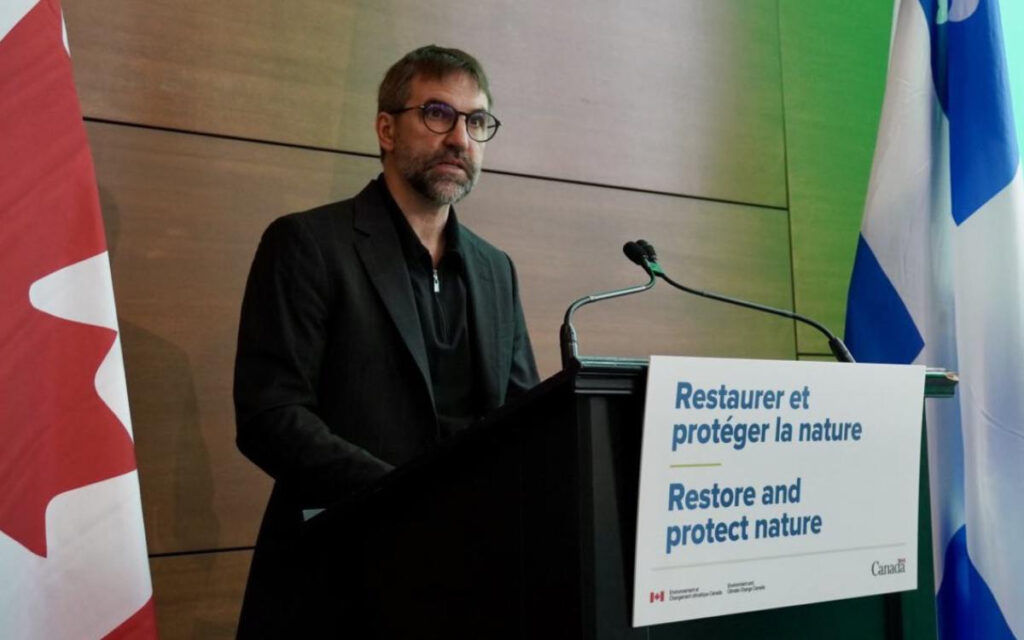
Even if Guilbeault is asked for his opinion at the cabinet table, he’s unlikely to be met with anything less than a complete dressing down based on the communications crisis he has managed to create for the staff in charge of cleaning up his mess. Photo Credit: X/Steven Guilbeault.
Never one to miss an opportunity to share his ideological leanings with the Canadian public, the Minister of Environment and Climate Change has struck again.
Much to the ire of anyone who has almost fallen victim to a head-on collision trying to navigate this year’s pothole castigation made worse by a boom or bust winter, Minister Steven Guilbeault made headlines on Tuesday when he said that current road infrastructure is “perfectly adequate to respond to the needs we have.”
He went on to state that there will be no new cash for things like highway upgrades, while simultaneously preaching the virtues of public transit and “active transportation” like walking and biking.
On its face, there is the immediate concern about the jurisdiction of these comments. First, Guilbeault isn’t in charge of doling out federal infrastructure cash. Second, the provinces are the ones who have the final say on whether a highway, road or bridge gets built.
And third, even if Guilbeault is asked for his opinion at the cabinet table, he’s unlikely to be met with anything less than a complete dressing down based on the communications crisis he has managed to create for the staff in charge of cleaning up his mess.
When pushed on his comments by reporters on Wednesday, he attempted to walk back the most egregious messaging by saying he should have been more specific and that he only meant the federal government wouldn’t be funding large projects.
Guilbeault’s comments are tone-deaf at best, and irresponsible at worst, but not for the obvious reasons you might think.
Most Canadians reading about Guilbeault’s communications snafu probably don’t believe the federal government is going to pump the breaks on infrastructure projects in the hopes Canada will soon be moving to a carless future. Thankfully, checks and balances still exist, and a public outcry can generally guarantee a certain outcome.
No, the problem here is that Guilbeault’s clickbait comments speak to a problem that exists within our political system now. Decision-makers forget that when they are elected, they must represent the interests of the broader Canadian public and not just those whose views they support.
Guilbeault has never made any secret about being a “radical pragmatist” and has been an activist for much of his adult life before he ran for politics. But at some point, it was probably expected that Guilbeault would hang up the hat of his previous life and start looking at the country for what it is – a vast network of rivers, mountains, rolling plains and eastern valleys.
It can take as much time to fly across the country as it does to jet off to Europe. God help anyone who must drive from one coast to the other. As for public transit, it’s great when it’s working in whatever major metropolitan city one hopes to find themselves in. For the roughly 6 million people in rural areas, however, you’re likely to find yourself out of luck.
Imagine if, when Guilbeault took over the environment portfolio, he took advantage of the opportunity to explore our vast country and get to know Canadians from all walks of life who live beyond the boundaries of downtown Montreal and Toronto. Picture trying to understand the issues facing Canadians in their communities, rather than lecturing them on an Ottawa knows best strategy.
But that’s wishful thinking. Much like hoping that cars will disappear from Canadian roadways.

Josie Sabatino is a Senior Consultant at Summa Strategies, focused on providing strategic insight and helping clients meet their objectives in an ever changing and complex political and regulatory environment. Prior to joining Summa, Josie spent nearly a decade in political communications and most recently served as the Director of Communications to the Hon. Erin O’Toole, former Leader of the Official Opposition.








